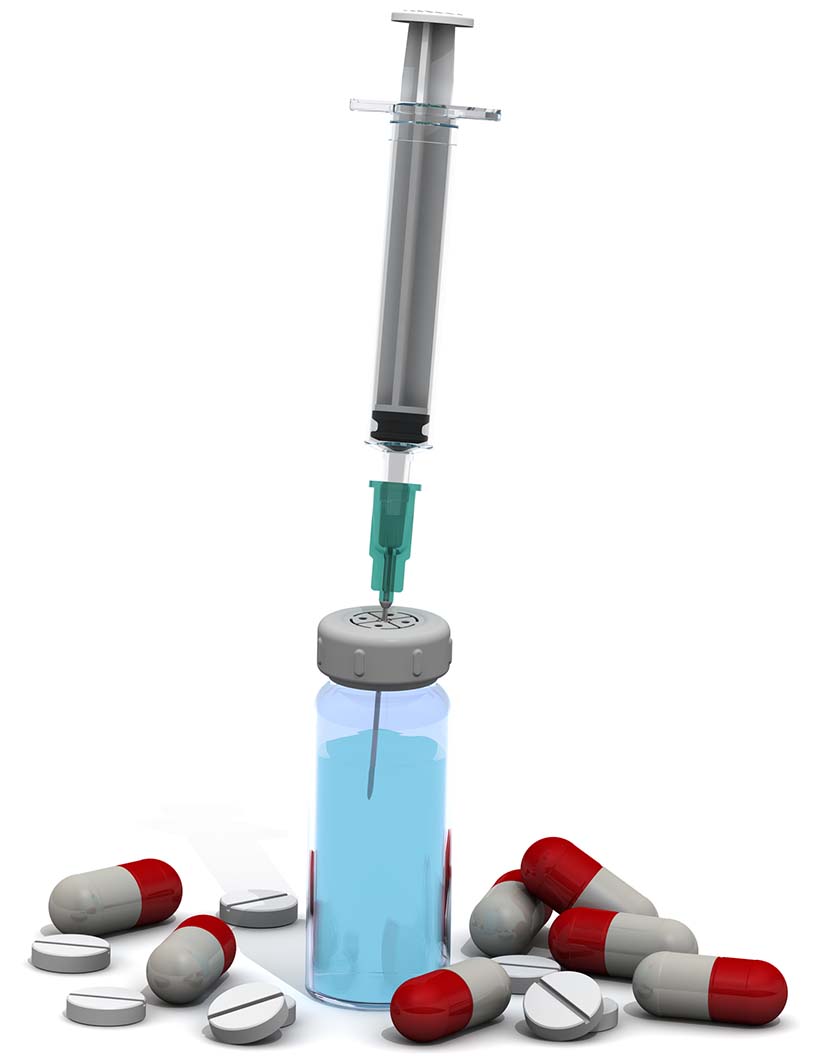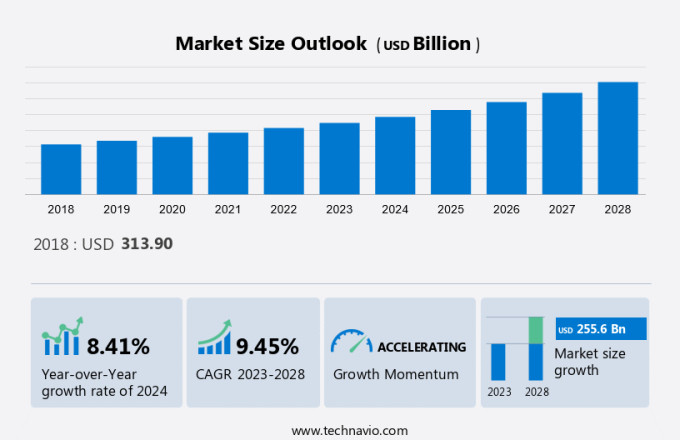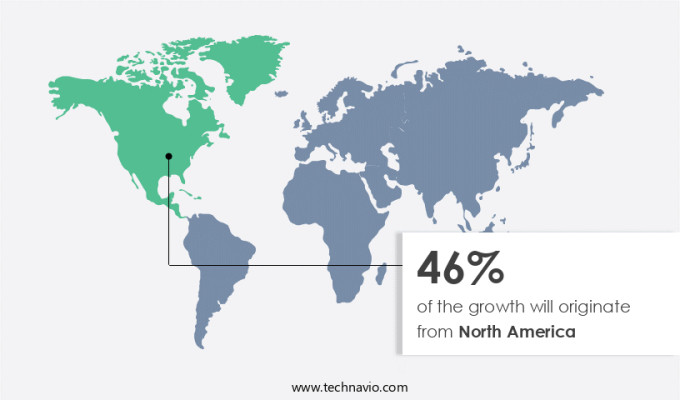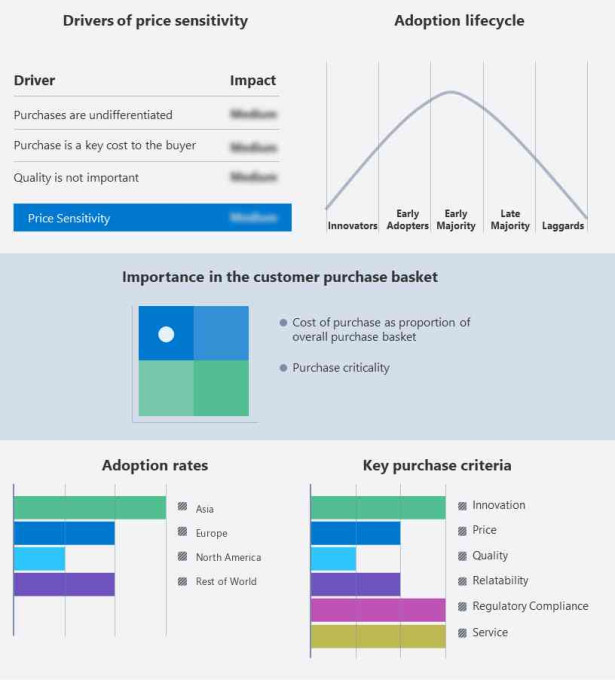Large Molecule Injectable Drugs Market Size 2024-2028
The global large molecule injectable drugs market size is estimated to grow by USD 255.6 billion at a CAGR of 9.45% between 2023 and 2028. The pharmaceutical industry is experiencing significant growth due to several key factors. Firstly, the increasing demand from emerging economies, particularly in Asia and South America, presents a vast market opportunity for pharmaceutical companies. Secondly, the investment in research and development (R&D) is at an all-time high, with a focus on innovative treatments and therapies. Lastly, advancements in gene and cell therapies are revolutionizing the industry, offering potential cures for previously untreatable conditions. These trends are driving the growth of the pharmaceutical sector, making it an exciting and dynamic industry to watch. Companies that can effectively navigate these trends and deliver innovative solutions will be well-positioned for success.
What will be the size of the Large Molecule Injectable Drugs Market During the Forecast Period?
To learn more about this Large Molecule Injectable Drugs market report, Request Free Sample
Large Molecule Injectable Drugs Market Segmentation
End-user Analysis
The market share growth by the hospital pharmacies segment will be significant during the forecast period. Hospital pharmacies are essential for managing and dispensing large-molecule injectable drugs and ensuring safe and effective use. Moreover, the increasing demand for personalized therapies in turn will increase the demand for biologics injectable drugs by this segment. This will also result in the growing importance of efficient inventory management, storage, and handling practices within hospital pharmacies to meet the needs of patients and healthcare providers.
Get a glance at the market contribution of various segments. View a PDF Sample
The hospital pharmacies segment was valued at USD 134.70 billion in 2018. The treatment and management of various chronic diseases like cancer and rare genetic disorders have been revolutionized by biopharmaceutical injectable drugs. With the rising number of biologics injectable drugs being developed and approved for clinical use, there is expected to be substantial market growth by this segment during the forecast period.
Type Analysis
The intravenous (IV) injection segment includes the direct delivery of medication into the bloodstream. This ensures that the distribution of the required medication to the target tissues or cells is rapid and efficient. This approach limits the possibility of adverse effects by reducing exposure of the medication to non-target tissues. Furthermore, such targeted delivery of medication is vital in personalized therapies that use large-molecule drugs like monoclonal antibodies. Moreover, the increasing demand for personalized therapies will also boost segment growth during the forecast period
Regional Analysis
For more insights about the market share of various regions, View PDF Sample now!
North America is estimated to contribute 46% to the growth of the global market during the forecast period. Technavio’s analysts have elaborately explained the regional trends and drivers that will shape the market during the forecast period. The North American region is the largest regional market due to the presence of well-developed healthcare systems such as hospitals, clinics, and specialized treatment centers that possess advanced infrastructure. They increasingly administer and manage large-molecule injectable drugs for the treatment of various chronic diseases like cancer, autoimmune disorders, and diabetes that require targeted therapy.
Moreover, this region has exceptional R&D infrastructure in the pharmaceutical industry, especially in biotechnology and large-molecule drugs. Some of the major global biopharmaceutical companies originate from North America and they conduct research and develop novel large-molecule injectable drugs. Hence such factors will fuel regional large molecule injectable drugs market growth during the forecast period.
Key Large Molecule Injectable Drugs Market Players
Companies are implementing various strategies, such as strategic alliances, partnerships, mergers and acquisitions, geographical expansion, and product/service launches, to enhance their presence in the market. The large molecule injectable drugs market growth analysis report also includes detailed analyses of the competitive landscape of the market and information about 20 market companies, including:
Boehringer Ingelheim International GmbH - The company offers large molecule injectable drugs such as HArmonyCa, JUVEDERM VOLBELLA XC, and JUVEDERM VOLUMA XC.
- Takeda Pharmaceutical Co. Ltd.
- AbbVie Inc.
- Amgen Inc.
- AstraZeneca Plc
- Baxter International Inc.
- Biogen Inc.
- Bristol Myers Squibb Co.
- Eli Lilly and Co.
- F. Hoffmann La Roche Ltd.
- Gilead Sciences Inc.
- GlaxoSmithKline Plc
- Johnson and Johnson Services Inc.
- Medtronic Plc
- Merck and Co. Inc.
- Novartis AG
- Novo Nordisk AS
- Pfizer Inc.
- Sanofi
- Sun Pharmaceutical Industries Ltd.
Qualitative and quantitative analysis of companies has been conducted to help clients understand the wider business environment as well as the strengths and weaknesses of key market players. Data is qualitatively analyzed to categorize companies as pure play, category-focused, industry-focused, and diversified; it is quantitatively analyzed to categorize companies as dominant, leading, strong, tentative, and weak.
Large Molecule Injectable Drugs Market Dynamics and Customer Landscape
Large molecules injectable drugs, also known as biologics, play a significant role in the healthcare industry with their ability to treat various diseases and conditions. These drugs, which include monoclonal antibodies, antibody drug conjugates, and therapeutic proteins, are derived from living organisms and are larger in size compared to small molecule drugs. The market for large molecule injectable drugs is driven by the increasing prevalence of chronic diseases such as diabetes, rheumatoid arthritis, and infectious diseases. Key active substances in this market include insulin for diabetes treatment and Etanercept for rheumatoid arthritis. The technology platform used to produce these drugs is a crucial factor in their development and commercialization.
Biotechnology plays a pivotal role in the production of large molecule injectable drugs, enabling the manipulation of proteins, amino acids, and immune cells to target specific cell receptor sites and interrupt disease process cascades. Injectable drugs are administered through minimally invasive procedures, making them preferred over oral medicines for certain conditions. Patients, hospitals, and medical workers are the primary consumers of these drugs. The market for large molecule injectable drugs is expected to grow due to the increasing demand for effective treatments for chronic diseases and the ongoing advancements in biopharmaceutical technology. Diseases such as diabetes, insulin-dependent, and autoimmune disorders like rheumatoid arthritis are major indications for the use of large molecule injectable drugs.
Key Market Driver
Increasing demand from emerging economies is the key factor driving the market. Emerging economies like India and Brazil are witnessing increasing detection of chronic diseases such as cancer, diabetes, cardiovascular diseases, and autoimmune disorders. For effective treatment and management of such conditions, large-molecule injectable drugs are vital. With increasing population and lifestyle changes there will be increasing demand for advanced therapies and large-molecule injectable drugs.
Additionally, several emerging economies are increasing healthcare expenditure, especially with regard to the establishment of specialized hospitals and healthcare centers. With improving healthcare infrastructure, the demand for large-molecule injectable drugs is also predicted to rise. Increasing awareness about the availability and effectiveness of these drugs is also contributing to large molecule injectable drugs market growth. These improved healthcare facilities enable the administration and management of large-molecule injectable drugs which will have a positive impact on the market during the forecast period.
Significant Market Trends
The increased focus on precision medicine and personalized therapies is a key trend in the market. The increasing prevalence of diseases that require targeted and effective treatments is accountable for the increasing demand for large-molecule injectable drugs. Some health conditions like cancer, autoimmune disorders, rheumatoid arthritis, and rare genetic diseases require treatment that manages the disease symptoms. Biologics injectables help to interact with specific molecular targets that play a role in disease processes, offering targeted therapy. They often demonstrate superior efficacy and safety profiles compared to conventional small-molecule drugs.
Moreover, they have higher efficacy and enhanced safety profiles in comparison to small-molecule drugs. They are vital in -precision medicine which requires treatments according to an individual's specific genetic profile or disease characteristics. Moreover, the increasing demand for personalized therapies due to a greater number of genomic testing and targeted treatments is resulting in the growing demand for biopharmaceutical injectable drugs. Hence such factors are expected to propel market growth during the forecast period.
Major Market Challenges
The high development and manufacturing costs are challenging market growth. The development and production of biopharmaceutical injectables are costly due to the high degree of complexity of the manufacturing process, and the requirement for sophisticated facilities and equipment. This may affect their affordability which will severely impact the profitability of companies in the market. Conducting clinical trials with a sufficient number of patients, ensuring safety and efficacy, and meeting regulatory requirements are costly endeavors.
Moreover, conducting clinical trials to ensure compliance with relevant regulations requires further costs to ensure safety and efficacy. These trials are conducted in controlled environments with the usage of advanced technologies for monitoring and control. Significant costs are also incurred for the acquisition of and maintenance of these facilities and equipment which will also pose a challenge to large molecule injectable drugs market growth during the forecast period.
Key Market Customer Landscape
The large molecule injectable drugs market report includes the adoption lifecycle of the market, covering from the innovator’s stage to the laggard’s stage. It focuses on adoption rates in different regions based on penetration. Furthermore, the large molecule injectable drugs market forecast report also includes key purchase criteria and drivers of price sensitivity to help companies evaluate and develop their growth strategies.
Global Market Customer Landscape
Segment Overview
The large molecule injectable drugs market research report provides comprehensive data (region wise segment analysis), with forecasts and estimates in "USD Billion" for the period 2024 to 2028, as well as historical data from 2018 to 2022 for the following segments.
- End-user Outlook
- Hospital pharmacies
- Retail pharmacies
- E-commerce
- Type Outlook
- Intravenous injection
- Muscle injection
- Subcutaneous injection
- Region Outlook
- North America
- The U.S.
- Canada
- Europe
- The U.K.
- Germany
- France
- Rest of Europe
- Asia
- China
- India
- Rest of the World
- Australia
- Argentina
- Brazil
- North America
Market Analyst Overview
The market is expanding rapidly, driven by advancements in biopharmaceuticals and the growing need for cardiac therapies, cancer therapies, and treatments for chronic conditions like Crohn’s disease and ankylosing spondylitis. These drugs, which include influenza vaccines, Alemtuzumab, Bevacizumab, and Atezolizumab, are designed to target specific cell receptor site and disrupt the disease process cascade. Injectable drug delivery options, including intravenous injections, injection pens, and devices like the Mounjaro device, are critical for administering these small molecules. Despite their efficacy, challenges such as side effects and the need for medical professionals to manage oral medicine versus injectable therapies remain. Innovative treatments like Tirzepatide and Imjudo are offering new hope in oncology and schizophrenia management. With the rise of e-commerce, the injectable drug delivery market is becoming more accessible, yet issues like needles and bloodstreams are important considerations.
|
Market Scope |
|
|
Report Coverage |
Details |
|
Base year |
2023 |
|
Historic period |
2018 - 2022 |
|
Forecast period |
2024-2028 |
|
Growth momentum & CAGR |
Accelerate at a CAGR of 9.45% |
|
Market growth 2024-2028 |
USD 255.6 billion |
|
Market structure |
Fragmented |
|
YoY growth 2023-2024(%) |
8.41 |
|
Regional analysis |
North America, Asia, Europe, and Rest of World (ROW) |
|
Performing market contribution |
North America at 46% |
|
Key countries |
US, China, Canada, Germany, and Japan |
|
Competitive landscape |
Leading Companies, Market Positioning of Companies, Competitive Strategies, and Industry Risks |
|
Key companies profiled |
AbbVie Inc., Amgen Inc., AstraZeneca Plc, Baxter International Inc., Biogen Inc., Boehringer Ingelheim International GmbH, Bristol Myers Squibb Co., Eli Lilly and Co., F. Hoffmann La Roche Ltd., Gilead Sciences Inc., GlaxoSmithKline Plc, Johnson and Johnson Services Inc., Medtronic Plc, Merck and Co. Inc., Novartis AG, Novo Nordisk AS, Pfizer Inc., Sanofi SA, Sun Pharmaceutical Industries Ltd., and Takeda Pharmaceutical Co. Ltd. |
|
Market dynamics |
Parent market analysis, Market growth inducers and obstacles, Fast-growing and slow-growing segment analysis, Market growth and Forecasting, COVID 19 impact and recovery analysis and future consumer dynamics, Market condition analysis for market forecast period |
|
Customization purview |
If our report has not included the data that you are looking for, you can reach out to our analysts and get segments customized. |
View Sample PDF at your Fingertips
What are the Key Data Covered in this Large Molecule Injectable Drugs Market Forecasting Report?
- CAGR of the market during the forecast period
- Detailed information on factors that will drive the market growth and forecasting of the market between 2023 and 2027
- Precise estimation of the size of the market size and its contribution to the parent market
- Accurate predictions about upcoming market trends and analysis and changes in consumer behavior
- Growth of the market industry across Europe, North America, APAC, South America, and Middle East and Africa
- Thorough market growth analysis of the market’s competitive landscape and detailed information about companies
- Comprehensive market analysis and report on the factors that will challenge the market research and growth of market companies
We can help! Our analysts can customize this Large Molecule Injectable Drugs market research report to meet your requirements. Get in touch




